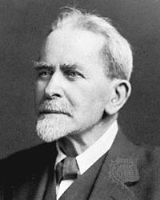
– 7 May 1941, Cambridge), was a Scottish social anthropologist influential in the early stages of the modern studies of mythology
and comparative religion
. He is often considered to be the father of modern anthropology.
His most famous work, The Golden Bough
(1890), documents and details similar magical and religious beliefs across the globe. Frazer posited that human belief progressed through three stages: primitive magic, replaced by religion, in turn replaced by science.
Born in Glasgow, Frazer attended school at Springfield Academy and Larchfield Academy
in Helensburgh
.
The heaviest calamity in English history, the breach with America, might never have occurred if George the Third had not been an honest dullard.![]()
By religion, then, I understand a propitiation or conciliation of powers superior to man which are believed to direct and control the course of nature and of human life.![]()
If the test of truth lay in a show of hands or a counting of heads, the system of magic might appeal, with far more reason than the Catholic Church, to the proud motto, Quod semper, quod ubique, quod ab omnibus (Always, everywhere, and by all), as the sure and certain credential of its own infallibility.![]()
It is a common rule with primitive people not to waken a sleeper, because his soul is away and might not have time to get back; so if the man wakened without his soul, he would fall sick. If it is absolutely necessary to rouse a sleeper, it must be done very gradually, to allow the soul time to return.![]()
The awe and dread with which the untutored savage contemplates his mother-in-law are amongst the most familiar facts of anthropology.![]()
The danger, however, is not less real because it is imaginary; imagination acts upon man as really does gravitation, and may kill him as certainly as a dose of prussic acid.![]()
The world cannot live at the level of its great men.![]()

